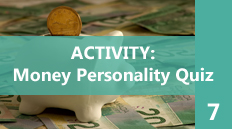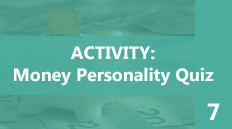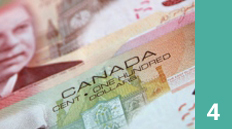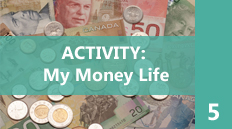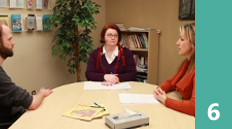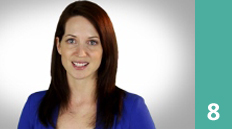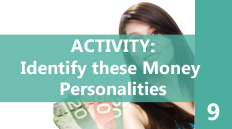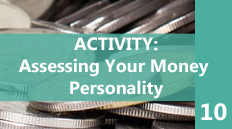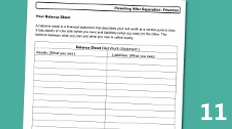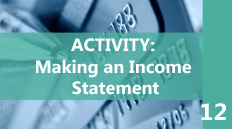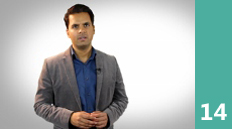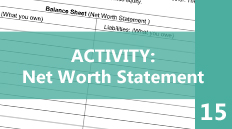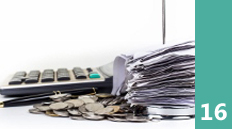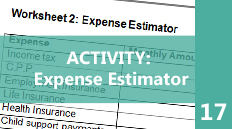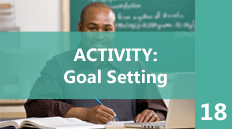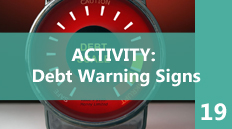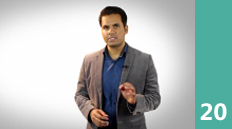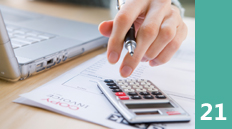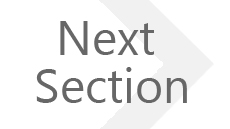ACTIVITY: Money Personality Quiz
Multiple choice quiz – per PAS Finances Handbook pg. What is your money personality? This quiz, designed by Olivia Mellan, will help you learn which of five major money personality types best describes you.
For each statement below, choose the answer that you think comes closest to describing your tendencies. There is no right or wrong answer. Don’t worry about the outcome. Be honest with yourself about your answers. When you are done, answer the quiz in the role of your former partner to see your money personalities may be very different.
1. If $20,000 came to me unexpectedly, my first impulse would be:
| A. To put it in my savings account. | B. To feel so overwhelmed that I’d put off making decisions about it for quite a while. |
| C. To invest it in order to make the biggest profits possible. | |
| D. To give most of it away and use it to make the world a better place. | |
| E. To spend it on things I really want, including gifts for others. |
2. When it comes to dealing with my money:
| A. I make sure that it never influences my life choices. | B. I enjoy spending it on gifts for myself and others, and on whatever will give me immediate pleasure. |
| C. I worry about it a lot and strategize how to make more and more of it. | |
| D. I hold on to it and enjoy thinking about the security it provides. | |
| E. I try not to think about it and hope it will take care of itself. |
3. My goals about my money are:
| A. To save enough of it now so that I never have to worry it in my old age. | B. Unclear to me. |
| C. To have enough of it to ensure that I can buy whatever I want | |
| D. To have enough to satisfy my basic needs and then to give the rest away. | |
| E. To make as much of it as possible, as quickly as possible. |
4. When it comes to following a budget:
| A. I rework my budget often to figure out ways to have more money to spend and save. | B. I enjoy following mine closely. |
| C. I take pride in living so simply that I’ve never needed a budget. | |
| D. I hate the word budget. Just hearing the word makes me want to rebel. | |
| E. I don’t have a budget and never want one. My money will take care of itself. |
5. When it comes to spending money:
| A. I hope I’ll have enough money to take care of unexpected expenses. | B. I enjoy spending money, as long as I keep accumulating it at the same time. |
| C. I’d rather save my money than spend it. Spending money makes me nervous. | |
| D. I don’t follow where my money goes, and I don’t want to. I focus on more important aspects of my life. | |
| E. I love spending money, and I tend to spend more than I earn. |
6. I deal with financial record keeping as follows:
| A. I keep reworking my records, to figure out ways to make more money or to make my money work better for me. | B. I’m not even sure which records I should be keeping. |
| C. I enjoy keeping careful records. | |
| D. I keep some records but have trouble organizing them and finding them. | |
| E. I don’t keep records. I hate to spend my time this way. |
7. When it comes to saving money:
| A. I know I ought to be saving money, but I never seem to get around to it. | B. I enjoy saving large amounts of money and spend a lot of time and energy thinking about how to save more. |
| C. I have trouble saving money, and this bothers me sometimes. | |
| D. I save only for absolute necessities. | |
| E. Saving comes naturally to me. I am regular and consistent about it. |
8. This is my attitude toward borrowing money:
| A. I try not to borrow money, but when I have, I find it hard to keep track of my progress in paying it back. | B. I try never to borrow money from others. |
| C. I’m willing to borrow large amounts if it will help me make more, but I worry about amassing debt if the profits don’t show up quickly. | |
| D. I’ve borrowed money quite often, and I’m pretty casual about paying it back. | |
| E. I borrow only for absolute necessities. |
9. When it comes to lending money:
| A. I’m pretty generous and don’t worry too much about when I’ll get it back. | B. People tend not to ask me for money. That suits me fine. |
| C. I wouldn’t mind lending money, but people hardly ever ask me. | |
| D. I try never to lend money, but if I do, I expect to be paid back promptly. | |
| E. I don’t mind lending money, if I get a good interest rate. I also worry about getting it back on time. |
10. As far as credit cards are concerned:
| A. I prefer not to have credit cards at all. If I have one, I use it as little as possible. | B. I tend to use credit cards often and make the minimum payment. |
| C. I don’t mind running up large charges, as long as I can pay them off quickly. I think about my credit card bills a lot. | |
| D. I don’t take much notice of the status of my credit cards. I often forget to pay even the monthly minimum until I get a warning notice. | |
| E. I have always tended to avoid using credit. I prefer paying by cash or check. |
11. When it comes to providing for emergencies:
| A. I don’t have enough saved to provide for emergencies. I just hope for the best! | B. I have no money set aside for emergencies, and I almost never think about what I would do if something bad were to happen. |
| C. I keep thinking that I’ll have enough to start saving for emergencies soon, but I’m still not quite there! | |
| D. I’ve put aside a sizable amount for emergencies, but I still worry about them! | |
| E. I try to save regularly for an emergency fund. |
12. When it comes to paying my taxes:
| A. I scramble to get together some minimal records, just to get the taxes done. I’m always surprised at how much money I owe every year. | B. I save regularly for taxes, and most years I complete my tax return well in advance. |
| C. I hate focusing on taxes and try to get them done with as little fuss as possible. | |
| D. I have trouble saving for taxes and doing my tax return, and I feel strapped every year before the deadline. | |
| E. I take pride in having more assets and paying lower taxes every year, if I can. |
13. To feel totally satisfied with my income, this is what I’d need:
| A. A few thousand more than I’m making now would be largely sufficient. | B. Increasing my earnings by a large amount every year is what satisfies me — $50,000 a year more would be nice! |
| C. I suppose I could always use more money, but I have no idea how much more. | |
| D. I feel satisfied with what I make now. A big increase would make me uncomfortable. | |
| E. At least $10,000 to $20,000 more than I’m making now. |
14. When it comes to investing in the stock market:
| A. I enjoy investing in the stock market, and I like to diversify to maximize my profits. | B. I don’t think about investing very often, but if I did invest, I’d want someone else to make those decisions for me. |
| C. I choose “safe” and conservative investments. | |
| D. I’m not an expert at investing, but I think it would be fun to invest in more speculative stocks that might offer a high rate of return. | |
| E. I don’t think about investing, but if I made any investments, I’d prefer those that were socially responsible. |
15. When I want a certain item but it’s not within my budget:
| A. Either I’ll decide I don’t really want it, or I’ll buy it and figure out how to pay for it later. | B. If I want it, I will buy it. I can always figure out a way to pay for it. |
| C. I will buy it, whether I can afford it or not. | |
| D. Most of the things I want are not expensive luxury items. If I do want something outrageous, I may buy it, but the purchase will make me feel very uncomfortable. | |
| E. If the item is important enough to me, I’ll figure out how to adjust my budget to afford it. If it isn’t that important, I’ll forget about it. |
16. When I’m feeling down in the dumps, spending money:
| A. Is the last thing I would do, putting some more money in savings might lift my spirits. | B. Always cheers me up. |
| C. Just makes me feel worse. Spending money has nothing to do with happiness. | |
| D. Is not what I think about to cheer myself up. | |
| E. In large amounts, and hatching plans to make more money, makes me feel better. |
17. I would take (or have taken) a bank loan under these circumstances:
| A. To pay off debts, to go on vacations, or to buy something I really wanted. | B. To finance my education - maybe. (I’ve never borrowed money. I never want to.) |
| C. To set up or expand a business, or to make an investment that would yield a high return | |
| D. To make essential repairs or to increase my future security. | |
| E. To deal with medical emergencies or other unforeseen circumstances but not for anything else |
18. I worry about money:
| A. Never. I worry about important things! | B. A little bit all the time. But I do all I can to manage it well. |
| C. Constantly. It’s the main thing I worry about! | |
| D. Only when financial crises strike. | |
| E. Not very much. I just enjoy spending it! |
19. When I think about providing for my future security:
| A. I am quite concerned that I won’t have enough money in my future, since it’s been so hard for me to save. | B. I have such a difficult time thinking about money that all I can do is hope that the future will take care of itself! |
| C. Since I make sure I have a lot of money at my disposal, the future will probably be fine. | |
| D. Considering how systematic I’ve been about saving for the future, I feel reasonably confident about it. | |
| E. I don’t think about the future in financial terms. I have more important concerns, such as my quality of life in the future. |
20. If I won a million dollars in the lottery, my first reaction would be:
| A. To feel guilty, thinking about the starving masses who have nothing. | B. To feel shocked, a little overwhelmed, and very relieved that my future was now secure. |
| C. To be totally overwhelmed — I would have no idea how to handle it. | |
| D. To be very happy and pleased, and to immediately start thinking about how I could simultaneously make my money grow and use it for my own enjoyment. | |
| E. To be wildly excited, realizing that from now on I could buy anything I wanted! |
Now that you’ve completed the quiz, here’s the key to determine which combination of money personality types you tend to be:
H = Hoarder; S = Spender; M = Money Monk; V = Avoider; A = Amasser
Refer to the following list as you score your answers, keeping count of how many
H’s, S’s, M’s, V’s, and A’s you’ve chosen.
| 1. | A= | S | B= | H | C= | V | D= | A | E= | M |
| 2. | A= | M | B= | S | C= | A | D= | H | E= | V |
| 3. | A= | H | B= | V | C= | S | D= | M | E= | A |
| 4. | A= | A | B= | H | C= | M | D= | S | E= | V |
| 5. | A= | V | B= | A | C= | H | D= | M | E= | S |
| 6. | A= | A | B= | V | C= | H | D= | S | E= | M |
| 7. | A= | V | B= | A | C= | S | D= | M | E= | H |
| 8. | A= | V | B= | H | C= | A | D= | S | E= | M |
| 9. | A= | S | B= | M | C= | V | D= | H | E= | A |
| 10. | A= | M | B= | S | C= | A | D= | V | E= | H |
| 11. | A= | V | B= | M | C= | S | D= | A | E= | H |
| 12. | A= | V | B= | H | C= | M | D= | S | E= | A |
| 13. | A= | H | B= | A | C= | V | D= | M | E= | S |
| 14. | A= | A | B= | V | C= | H | D= | S | E= | M |
| 15. | A= | V | B= | A | C= | S | D= | M | E= | H |
| 16. | A= | H | B= | S | C= | M | D= | V | E= | A |
| 17. | A= | S | B= | M | C= | A | D= | H | E= | V |
| 18. | A= | M | B= | A | C= | H | D= | V | E= | S |
| 19. | A= | S | B= | V | C= | A | D= | H | E= | M |
| 20. | A= | M | B= | H | C= | V | D= | A | E= | S |
My score:
| H: | S: | M: | V: | A: |
My former partner's score:
| H: | S: | M: | V: | A: |
Which letter has the highest score? That one represents your predominant money personality type (or types).
My predominant money personality type is:
My former partner’s predominant money personality type is:
